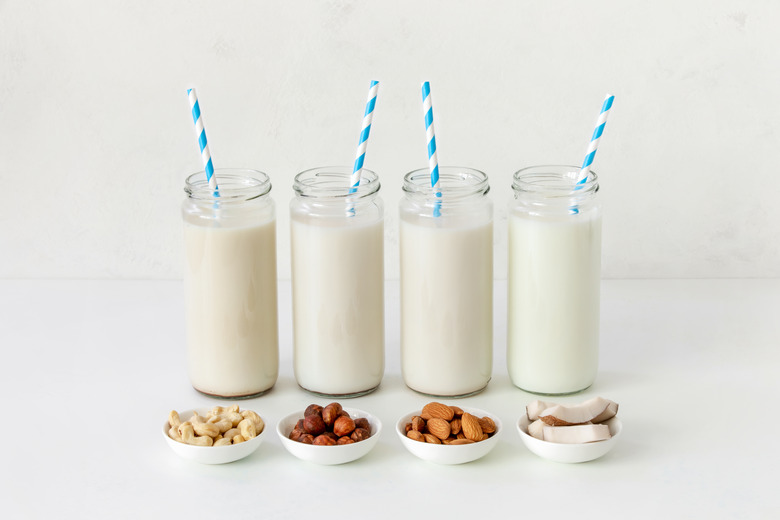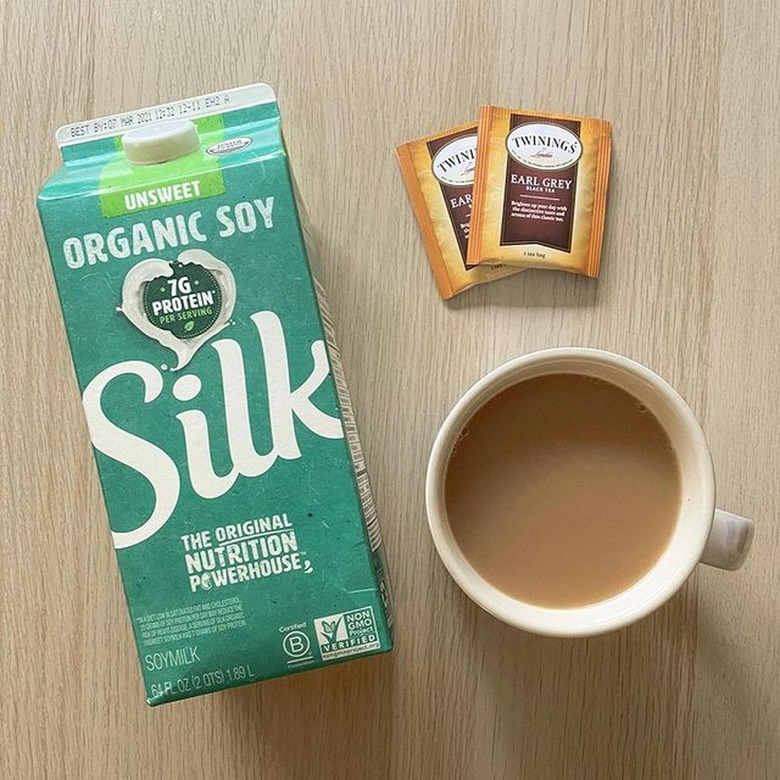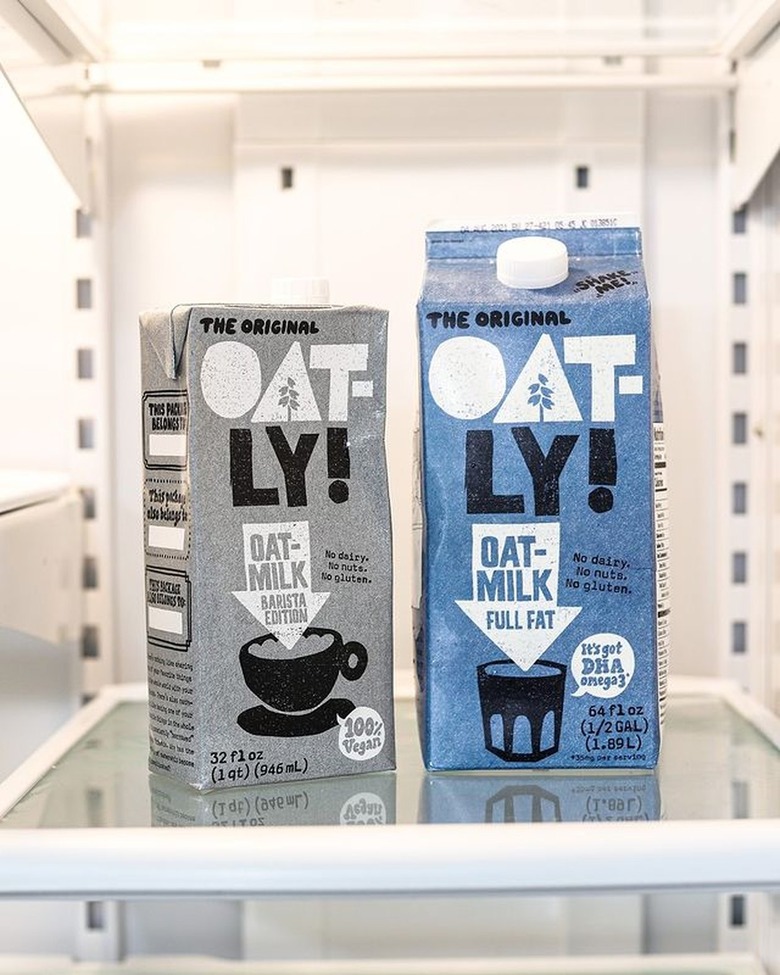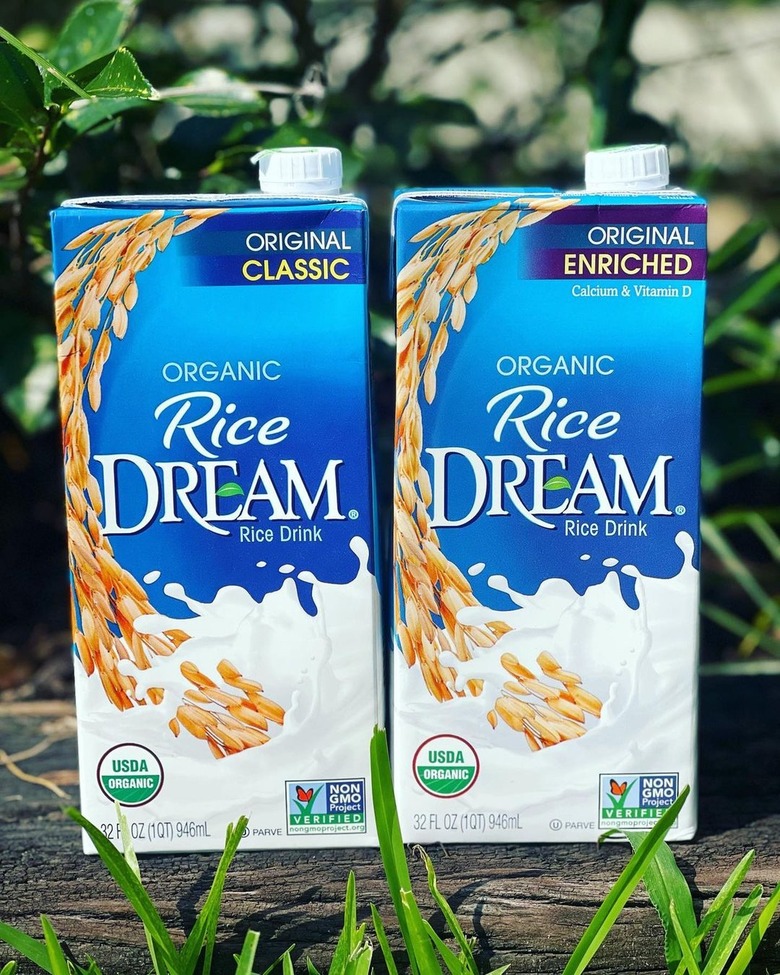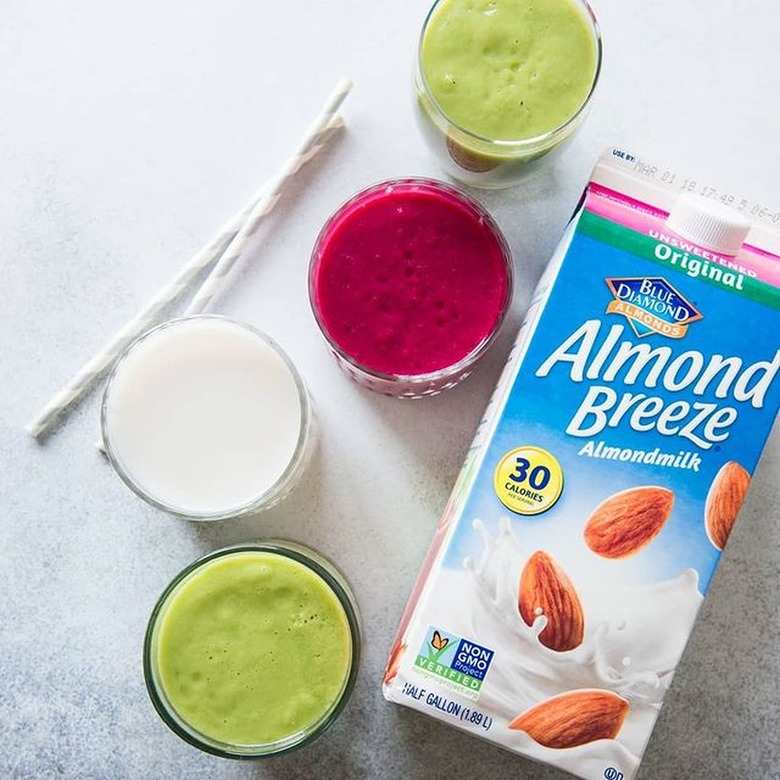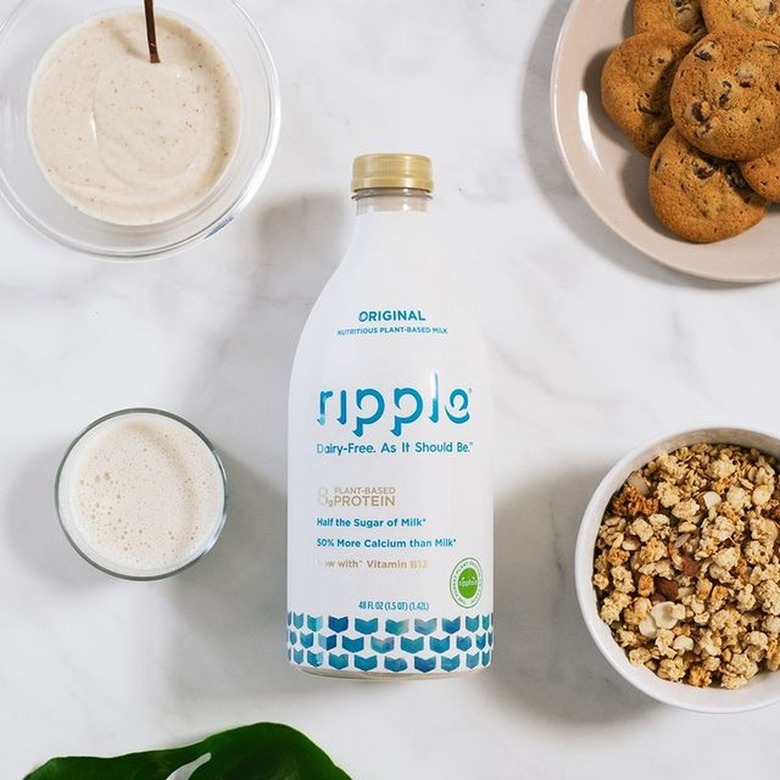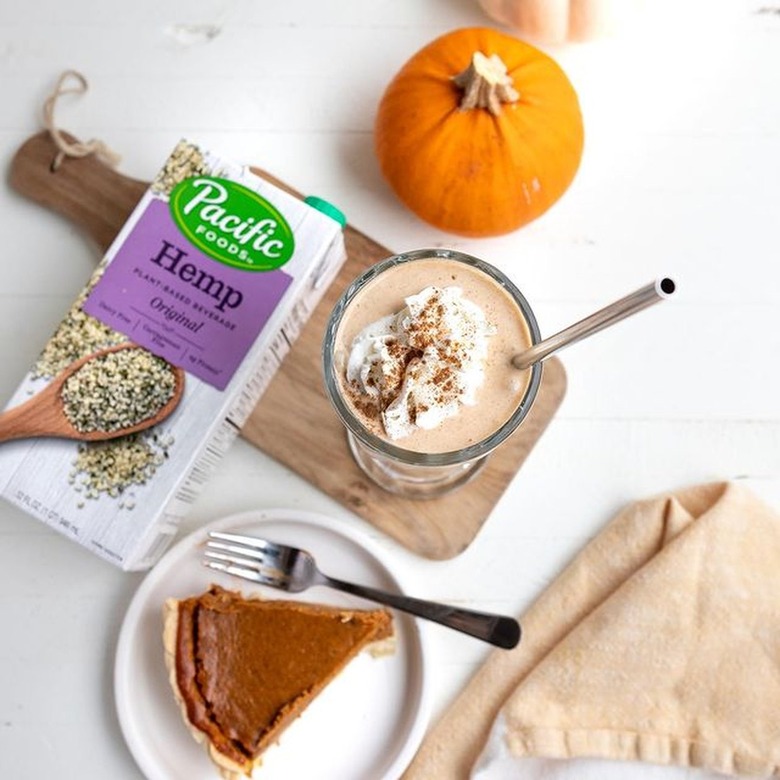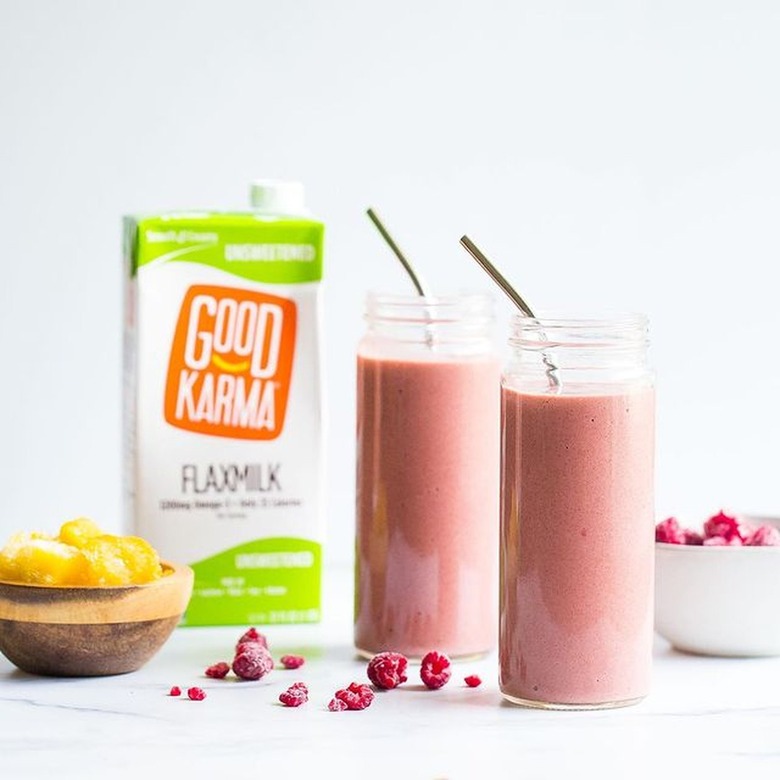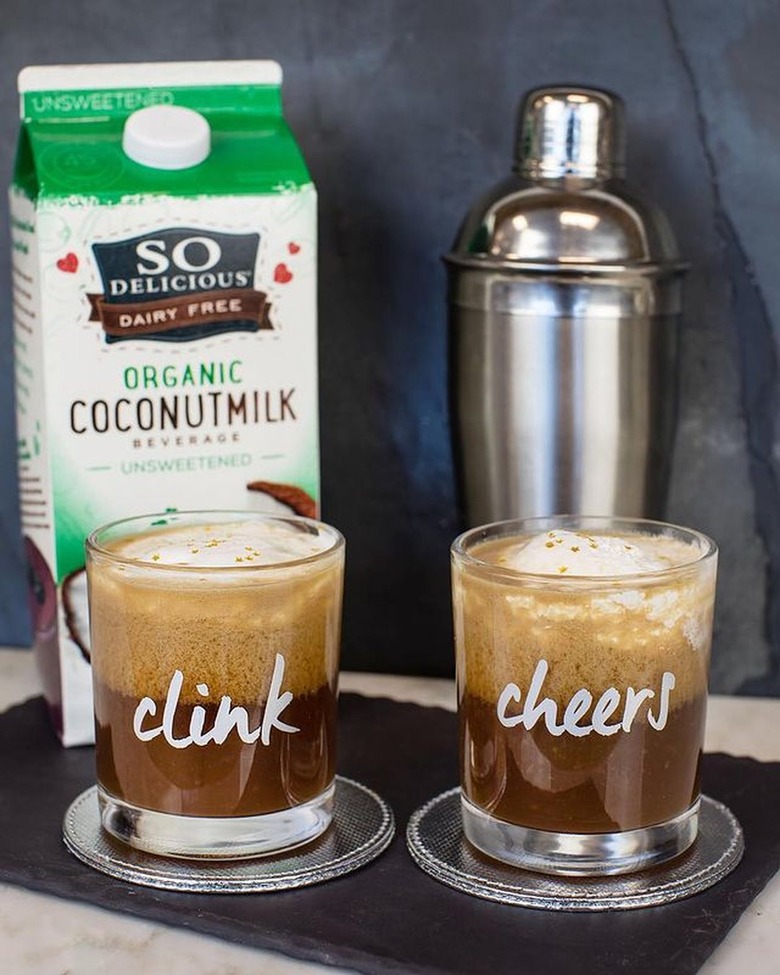Non-Dairy Milk 101: Which Plant-Based Milk Should You Use?
Non-dairy milks, also known as plant-based milks or "mylks," are having a moment right now. These dairy alternatives are everywhere nowadays, from grocery stores to chain coffeehouses. In fact, according to the data from the Good Food Institute, plant-based milks make up 35% of the entire plant-based food market — more than any other category.
The buzz is well-deserved, too. Not only are plant-based milks suitable for people who are lactose intolerant or vegan — they're also significantly better for the environment. For example, compared to cow's milk, non-dairy milks produce less greenhouse gas emissions (aka the cause behind climate change).
But with so many non-dairy milks available, choosing a product can be overwhelming. Read on for a deep dive into popular plant-based milks, plus the best uses for each one.
1. Soy Milk
1. Soy Milk
Soy milk, which is made by soaking and crushing soybeans with water, is basically the OG plant-based milk. The beige beverage — which dates back to 14th-century China — became popular in the United States in the '70s and '80s, according to the Institute of Food Technologists.
Nutritionally speaking, "Soy milk [has a] similar protein content to cow's milk," registered dietitian Chrissy Williams, M.S., R.D, tells Hunker. This makes it the best choice for baking, as the protein gives structure to baked goodies. Soy milk also has a creamy consistency, notes Williams, making it useful for creating luscious smoothies or lattes. The only catch? For some folks, soy milk has a sharp aftertaste. Depending on your taste buds, it might be more palatable in savory dishes or baked goods with other ingredients.
"Soy milk is also a winner in the sustainability department," Laura Wittig, co-founder and CEO of the eco-conscious platform Brightly, tells Hunker. Case in point: According to a 2018 study from the University of Oxford, soy milk produces half the greenhouse gas emissions that cow's milk yields. It also uses significantly less land than cow's milk, according to the study.
2. Oat Milk
2. Oat Milk
In recent years, oat milk has stolen the spotlight. Not only does it offer energizing carbs and satiating fiber, but it's wonderfully creamy too. That said, it's ideal for making rich smoothies and lattes, according to Williams.
What's more, oat milk is allergy friendly. After all, most plant-based milks are made with nuts or soy (aka common allergens). Oat milk is also naturally gluten-free, but it's worth noting that oats may be cross-contaminated with traces of gluten. "If you have a specific allergy or sensitivity, take the time to do research on specific ingredients and brands' processing facilities," recommends Williams.
In terms of sustainability, oat milk is just as impressive. It's the most environmentally friendly of all plant-based milks, "as it produces the least emissions and uses the least land and water," Margarita Restrepo, founder of WFPB.org — a non-profit organization that provides certifications for whole, plant-based products and services — tells Hunker. Oats are also minimally processed, she adds. Translation: Less waste.
3. Rice Milk
3. Rice Milk
Rice milk is made from boiled brown rice. It's naturally sweeter than other plant milks, thanks to its high starch content. However, it tends to be more watery than other non-dairy milks, so it may not be your go-to for creamy drinks. Still, many people use it like dairy in foods such as cereal or rice pudding.
Nutritionally, there's not much in rice milk. It's low in protein, fiber, and fat, according to Nutrition Issues in Gastroenterology. Rice milk is high in carbs, though, so you'll want to limit this option if you're watching your blood sugar levels. As for allergies? Rice isn't a common allergen, so its milk counterpart is allergy friendly. But again, there's the possibility of cross-contamination with gluten, so be sure to double check the label if you avoid the substance.
On the sustainability front, "Rice milk isn't the best choice," Wittig says. "It not only generates higher amounts of greenhouse gases than other plant milks, but it also requires a lot of water to produce."
4. Almond Milk
4. Almond Milk
Almond milk (ground almonds plus water) rivals oat milk in terms of popularity. And it's easy to see why — almond milk is nutty, slightly sweet, and wonderfully creamy. These features make it ideal for thickening drinks, though its flavor might be off-putting in savory dishes. You might prefer using almond milk in smoothies and sweet treats instead.
Also, though whole almonds are high in protein, much of that protein is lost during the manufacturing of almond milk. If nutrient content is top of mind, almond milk may not be your best pick.
Despite its flavor and texture, almonds score low on the sustainability scale. According to Restrepo, "Almond trees absorb carbon dioxide, which helps offset their water consumption, but it takes more than a gallon of water to make a single almond." (As in ... one almond.) Still, compared to cow's milk, almond milk has a lower water footprint, says Wittig. "It [also] has lower greenhouse gas emissions than most alt milks," she adds.
5. Pea Protein Milk
5. Pea Protein Milk
If you're searching for an alt milk with the same taste and texture as cow's milk, consider pea protein milk. Surprisingly, it has a similar flavor and consistency when compared to cow's milk, so it might just hit the spot. As a result, pea milk can be used in all the ways you'd use cow's milk, from cereal to baking. It also has a similar protein content to cow's milk, notes Williams.
Plus, according to Nutrition Issues in Gastroenterology, pea milk is environmentally friendly. Yellow pea plants are easy and cheap to grow, meaning that this milk uses less water than almond milk.
6. Hemp Milk
6. Hemp Milk
Looking for a milk that plays well in savory dishes? Reach for hemp milk, which is made of hemp seeds. It's gluten-free and has a slightly nutty, earthy flavor. And though hemp milk isn't a rich source of protein, it does contain more than other plant milks. Thus, it may help give structure to baked goods.
Hemp milk is also one of the most environmentally friendly options after oat milk, Restrepo explains. "Hemp plants require very little water to grow, and they grow very well without herbicides and pesticides," she says, adding that hemp plants breathe in four times more carbon dioxide than trees, meaning they help clean our air.
7. Flax Milk
7. Flax Milk
Flax milk, made of cold-pressed flax oil and water, has a slightly earthy and nutty flavor. But it's less nutty than almond milk, so it may be a better option for savory recipes. It also has a smooth and somewhat creamy consistency, which may be ideal in drinks. Additionally, flax milk is gluten-free and packed with healthy omega-3 fats.
As for its environmental impact? Flax milk is in the same boat as hemp milk. "Flax seeds are pest-resistant and grow very well without fertilizers and chemicals," states Restrepo. "They don't require much irrigation to grow, [as] rainwater provides sufficient moisture for the plants."
8. Coconut Milk
8. Coconut Milk
Perfectly rich and creamy, coconut milk is excellent for thickening soups, sauces, and drinks. Full-fat canned coconut milk, in particular, is excellent for giving structure to creamy vegan desserts like cheesecake and pumpkin pie. The milk, which is made of grated coconut meat, is also a popular ingredient in Southeast Asian cuisine.
But unfortunately, coconut milk is one of the least sustainable alt milks. As Restrepo says, "About 80% of coconuts come from Indonesia, Thailand, the Philippines, India, and other tropical countries. The long-distance transportation significantly contributes to greenhouse gas emissions from boats, planes, and trucks." Meanwhile, in countries like Brazil and Colombia, coconut farming is destroying the Amazon rainforest. "Land is often cleared to grow coconut trees, which harms wildlife and reduces biodiversity," shares Restrepo.
Though coconut trees filter carbon dioxide, "the discarded parts of coconuts are usually burned," says Restrepo. This releases carbon dioxide and methane (two greenhouse gases) into the environment.
How to Choose a Plant-Based Milk
How to Choose a Plant-Based Milk
Is your head spinning yet? Don't worry — we've got your back.
If you're unsure which plant-based milk to try, consider your allergies or intolerances first. You can find allergen warnings under the ingredients list on product packaging. Next, think about what's most important to you. Nutrition? Flavor? Consistency? Environmental impact? From there, narrow down your choices based on these factors and how you plan to use the milk.
It might take some trial and error to figure out which non-dairy milk (and brand) meshes with your taste buds and needs. This is especially true if you're new to non-dairy milk in general. "Start with small steps, like using a plant-based milk in your morning smoothie or coffee," encourages Wittig. "Even these tiny changes can make a big difference."
